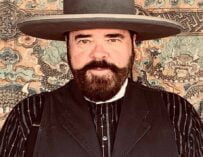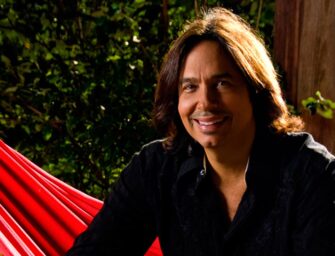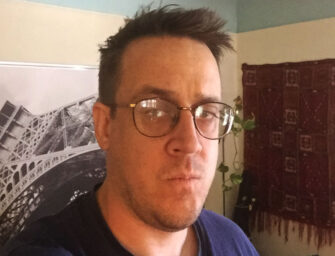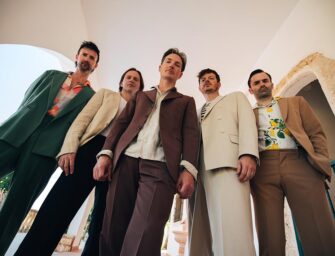As Robbie Williams’ creative partner, Guy Chambers played his part in writing some of the most memorable songs in British music history
When songwriter Guy Chambers met Robbie Williams neither could have known the glorious future that awaited them. It was 1997 and Williams, fresh from his departure from the boyband behemoth that was Take That, needed some help in writing the songs that would launch his solo career. Looking back, it’s fair to say he couldn’t have chosen a better comrade.
It was also something of a second life for Chambers who had previously played keyboards with acts such as The Waterboys and had some success with his own band The Lemon Trees, before losing his way after being dropped by the group’s label. Re-energised by their new partnership, Chambers and Williams lit up the charts with singles such as Angels, Let Me Entertain You, Millennium and No Regrets. That Chambers has also worked with artists such as Rufus Wainwright, Lily Allen and Kylie Minogue just highlights how respected he is as a songwriting partner
For his latest project, Go Gentle Into The Light, Chambers has recorded simple piano versions of many of his and Williams’ best-loved tracks. Reducing these songs to their barest elements, the songcraft behind them shines through… As did Chambers’ lasting affection for his body of work during our recent conversation…
Did you always have a love of songwriting or did that grow from playing music?
“It started from playing the piano. I discovered at an early age that it wasn’t enough for me to just play music on the page, like Mozart or Bach, I wanted to improvise. I started improvising when I was about seven or eight and luckily my piano teacher didn’t think that it was evil. She encouraged it.
“Then, when I was a little bit older, I wrote a string quartet. I also wrote an opera when I was at school, which the school performed. I had some pretensions of grandeur. You could argue that I still have them now. But in terms of writing pop songs, I didn’t really have enough confidence until I was 18/19.”
Was that before you were playing keyboards for the likes of Julian Cope and The Waterboys?
“Yeah, the first song I ever released was a song with Marc Almond and it was called Skin. It was on a little independent label called Some Bizarre. That got released when I was still at college and it got a really good review in the NME, which was cool. I didn’t see a penny from it, but that doesn’t matter, it was just great to record. I produced it myself, we had a mutual friend and that’s why Marc came in to sing it, he just liked the song.”
What happened next?
“When I left college I played with various different bands, like The Waterboys and World Party. I was actually in that band for five years, we toured the world and I learnt a lot from Karl Wallinger. I think he’s one of the greatest English songwriters. He wrote She’s The One, of course, one of Robbie’s biggest songs. That band was like songwriter university.
“Not only was Karl a brilliant songwriter, he was also very good at doing cover versions. When we would rehearse we would play endless covers: Neil Young, Bob Dylan, The Band, The Clash, Tim Buckley, all sorts. That was a very good thing for me to do, it taught me how songs work, especially when you perform them live. I’m a great believer in songs being able to work live. When I produce songs I am often thinking about what kind of impact it is going to have on stage.”
Were you banking your own songs too?
“I was writing through my 20s but I didn’t get much encouragement from Karl, he didn’t really like my songs. That was the reason I left World Party to form The Lemon Trees. That was about 1991. I was 28 and ready to stand on my own two feet.”
Considering the success you’ve had, why do you think you didn’t scale similar heights with The Lemon Trees?
“We had the wrong singer. We didn’t really have a frontman. I tried to sing, which is quite funny in itself, and we had two other singers. The keyboard player sang and the bass player sang and none of us were stars.
“The first album actually did quite well, all of our singles were played on the radio and on The Chart Show. We toured with Jellyfish and Suzanne Vega, so it was all going really well. But then we made that classic mistake of making our second album completely different to the first and that’s when we got dropped. The label hated it. That was a mistake I didn’t want to repeat with Rob.”
Were you ready to chuck it all in before you met him?
“The Lemon Trees split up around 1994 and then there was a three-year gap before meeting Rob. In that gap, I worked with Cathy Dennis. I met Annie Lennox and we tried to write but it didn’t really click, or she didn’t like the songs that we did. There were many times during the 90s when I thought about jacking it all in and becoming a music teacher. Luckily, I met Rob in 1997 and that changed everything.”
How did that meeting come about?
“My publisher Paul Curran called me and said, ‘Do you know who Robbie Wiliams is?’ and of course I did, he said, ‘Do you want to work with him?’ I said that I would give it a go. The following day, Rob called me up and asked if I could write dirty pop and as soon as he said that sentence I knew that we were going to click.”
It’s easy to now see everything that you’d gone through previously as leading up to that moment…
“I did have very thorough training. At the time, it felt like I had to wait forever to be successful. When I met Rob I was 34, ancient in pop years. That was the height of the Britpop and there were lots of young bands coming through. But that was a good thing because Rob needed someone to be like an older brother and help guide him, steer the ship and find the right band. He actually knew the sound he wanted, but I needed to refine it and be the responsible one in the partnership, he was pretty crazy.”
How did that partnership progress?
“We were in a room together, face-to-face, with a guitar or a piano. It was very old school and we wrote Angels on our second day, just on piano. Initially, we only had two days together, like a try-out, as happens so often with any jobbing songwriter – you get given a couple of days and it’s a lot of pressure.
“Thank God he came in with that idea. He came in with the topline, which I think he had been saving until he felt somebody could actually find the right music to suit it. He obviously trusted me, even though we’d only known each other for one day. Once we’d written that everyone was like, ‘That’s amazing, you should carry on.’ So we wrote the rest of the album.”
Why do you think you had such strong chemistry between you?
“We both really needed one another. I really needed a star and he really needed someone with a lot of experience. He had worked with various people but not all of them knew what they were doing. I wasn’t into drugs so I wasn’t going to the Groucho Club with him to get off my head.
“It was a working relationship and still is. He did come on holiday with me but it would be a family holiday. We weren’t big party animals together. He felt safe with me and trusted me and knew I wasn’t going to talk to the press or do anything stupid like that.”
Were you happy becoming a songwriter for another artist?
“I’d had my own band, but that was quite uncomfortable really; standing up on stage and singing my songs. I instinctively knew that wasn’t what I wanted to do – which is ironic as I have my own album out now. But it’s different as it’s a piano album. I’m not singing. It’s just music and I’m confident about playing the piano, whereas I was never that confident about singing.
“When I was working with Rob, the way I saw it, especially in the first five years, we were the band. I picked all the musicians and that had a huge influence on his sound. Let Me Entertain You, Angels, Man Machine… a lot of the big songs in the early days were a band sound.
Did you have to change much about your songwriting process to suit his style?
“I had to make a few adjustments. He would challenge me. When we wrote Let Me Entertain You he said, ‘Do you have any jungle beats?’ and I didn’t really know what jungle was. Fortunately, I managed to find some and we then started with that beat. The riff was written to a jungle beat, believe it or not. Millennium, he had the idea of sampling the James Bond music from You Only Live Twice, so I had to adjust to that. I had to learn new tricks and that was good. He still pushes me.”
Was there pressure to follow up Life Thru A Lens with another success?
“As soon as we’d finished Life Thru A Lens, literally while it was being mixed, we were working on the second album. I encouraged him to keep going with the songwriting. He writes all the time and I’m sure he’s probably writing a song today. I think it’s his favourite part of being a pop star, writing songs.”
Would you say that he’s underrated as a songwriter?
“I really do think Rob is underrated as a songwriter, massively. Especially as a lyricist; I think his lyrics are amazing and I think he’s written some great melodies as well. Because he’s such a big star and personality, it overshadows his other talents a bit.”
Did you think of it as an exclusive relationship?
“Well he didn’t ask for exclusivity, and he never has. But we did write together all of the time so there wasn’t much time for him or me to work with anyone else in the first five years. I was in the touring band so we were touring, writing, recording or doing TV.”
When did the relationship change?
“I suppose when me and him had our sabbatical and he started writing with other people. On Escapology, he wrote with other people and that was good for his development. It was a bit painful for me, I suppose my ego was a bit squashed by it. In those interim years, when I wasn’t working with him, I worked with lots of great people and it’s been an interesting journey.”
Are there any other partnerships which mean a lot to you?
“One of the main ones would be Rufus Wainwright. I’ve written quite a few songs with Rufus.”
What are you looking for in an ideal musical collaborator?
“Great lyrics would be the number one thing. I hate weak/lazy lyrics with empty clichés. I also don’t like endless songs about going to a club, that typical scenario that a lot of people use. I find it really boring. I like originality, for a songwriter to come up with an interesting concept. If I was writing with anyone at the moment I’d probably want to write a song about Extinction Rebellion.”
Do artists always bring the lyrics to you?
“No, it depends. Sometimes I have a concept. Rob and I wrote a song called Party Like A Russian a few years ago and that was my concept. I had the title and thought it would be fun to write a song about a country and to both take the piss and celebrate the craziness of being a Russian. I had the Prokofiev sample and then it was a lot of work to make the lyric as good as it could possibly be. We had tons and tons of re-writes that went on for about a year.”
Do you enjoy that refining process?
“I wouldn’t say, ‘enjoy.’ It’s a process and I will always respect co-writers who want to get it as good as possible. Rob is pretty hard on himself, lyrically. When he puts out a single he has to stand up and sing it in front of lots of people and believe it night after night. He can’t think halfway through, ‘God this lyric is weak.’ That’s a big responsibility. When you’re trying to write a hit, you’ll be singing it until you die. So it better be a lyric you can relate to, otherwise you’ll end up hating it.”
Let’s talk about Go Gentle into the Light… What was the idea of stripping away the lyrics and only having the piano tracks?
“Simplicity really. My manager had encouraged me to do a solo album and I thought I could do something really indulgent, with an orchestra and lots of singers and guests, but then I thought, ‘Wouldn’t it be nice to do something that was very simple.’
“It was recorded in Abbey Road’s Studio One, which is a very awe-inspiring room with so much history, on a beautiful Steinway. That was enough for me. The challenge was stripping back those songs and going to the heart of the melodies. Maybe people can look at the songs that they know so well in a different way.”
How did you choose the 11 songs?
“I started with a list of the most famous songs and then I realised quite quickly that Rock DJ wouldn’t be great on the piano and that Let Me Entertain You would be very clumsy. I also realised that I wanted the album to have one reflective, peaceful mood.
“I wanted to make an album that people could put on and it’s just there. They either tune in to it or they can have it on in the background and it helps them relax. We live in high tension times and so I wanted an album that could help people heal their differences and frustrations.”
Did any of the songs reveal something new to you?
“A few of them did, The Road To Mandalay in particular. I always believed in that song but I really like the new version of it. I think it has a power to it and it will be the standout track on the entire album.”
And lastly, how did the process of making the album make you feel about your body of work with Rob?
“I’m very proud of it and it will be very nice to share a different way of looking at that work. I’m going to do a tour later in the year and maybe some people will take Rob more seriously as a songwriter. He deserves that.”






































Related Articles